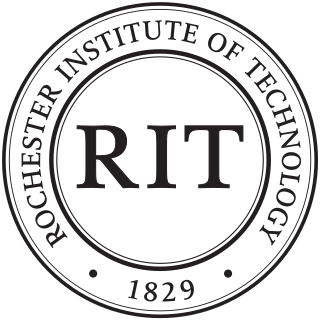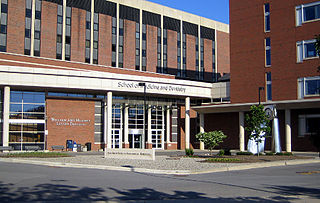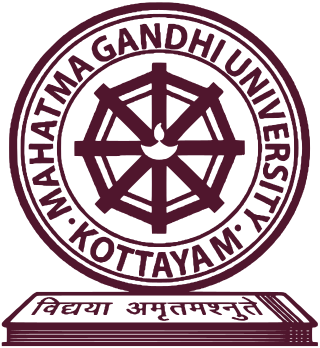Related Research Articles

Political science is the scientific study of politics. It is a social science dealing with systems of governance and power, and the analysis of political activities, political thought, political behavior, and associated constitutions and laws.

The University of Rochester is a private research university in Rochester, New York. The university grants undergraduate and graduate degrees, including doctoral and professional degrees.
William Harrison Riker was an American political scientist who is prominent for applying game theory and mathematics to political science. He helped to establish University of Rochester as a center of behavioral revolution in political science.

Rochester Institute of Technology (RIT) is a private research university in the town of Henrietta in the Rochester, New York, metropolitan area. The university offers undergraduate and graduate degrees, including doctoral and professional degrees and online masters as well.

Rochester is a city in the U.S. state of New York, the seat of Monroe County, and the fourth-most populous in the state after New York City, Buffalo, and Yonkers, with a population of 211,328 as enumerated in the 2020 United States census. Located in Western New York, the city of Rochester forms the core of a larger metropolitan area with a population of 1 million people, across six counties. The city was one of the United States' first boomtowns, initially due to the fertile Genesee River Valley, which gave rise to numerous flour mills, and then as a manufacturing center, which spurred further rapid population growth.

The Mayo Clinic is a nonprofit American academic medical center focused on integrated health care, education, and research. It employs over 4,500 physicians and scientists, along with another 58,400 administrative and allied health staff, across three major campuses: Rochester, Minnesota; Jacksonville, Florida; and Phoenix/Scottsdale, Arizona. The practice specializes in treating difficult cases through tertiary care and destination medicine. It is home to the top-15 ranked Mayo Clinic Alix School of Medicine in addition to many of the highest regarded residency education programs in the United States. It spends over $660 million a year on research and has more than 3,000 full-time research personnel.

Oakland University is a public research university in Auburn Hills and Rochester Hills, Michigan. Founded in 1957 through a donation of Matilda Dodge Wilson, it was initially known as Michigan State University-Oakland, operating under the Michigan State University Board of Trustees. The university gained institutional independence from the board in 1970 and was renamed Oakland University.
The Laboratory for Laser Energetics (LLE) is a scientific research facility which is part of the University of Rochester's south campus, located in Brighton, New York. The lab was established in 1970 and its operations since then have been funded jointly; mainly by the United States Department of Energy, the University of Rochester and the New York State government. The Laser Lab was commissioned to serve as a center for investigations of high-energy physics, specifically those involving the interaction of extremely intense laser radiation with matter. Many types of scientific experiments are performed at the facility with a strong emphasis on inertial confinement, direct drive, laser-induced fusion, fundamental plasma physics and astrophysics using the Omega Laser Facility. In June 1995, OMEGA became the world's highest-energy ultraviolet laser. The lab shares its building with the Center for Optoelectronics and Imaging and the Center for Optics Manufacturing. The Robert L. Sproull Center for Ultra High Intensity Laser Research was opened in 2005 and houses the OMEGA EP laser, which was completed in May 2008.
Positive political theory (PPT) or explanatory political theory is the study of politics using formal methods such as social choice theory, game theory, and statistical analysis. In particular, social choice theoretic methods are often used to describe and (axiomatically) analyze the performance of rules or institutions. The outcomes of the rules or institutions described are then analyzed by game theory, where the individuals/parties/nations involved in a given interaction are modeled as rational agents playing a game, guided by self-interest. Based on this assumption, the outcome of the interactions can be predicted as an equilibrium of the game.

The University of Rochester Medical Center (URMC), now known as UR Medicine, is located in Rochester, New York, is one of the main campuses of the University of Rochester and comprises the university's primary medical education, research and patient care facilities.

Mahatma Gandhi University (MGU), commonly referred to as MG University, is a state owned public university headquartered in Kottayam in the state of Kerala, India. It was established on 2 October 1983 on Gandhi Jayanti day. Mahatma Gandhi University has been approved by University Grants Commission (UGC) and accredited (A) by the National Assessment and Accreditation Council of India. The university has around 300 affiliated colleges spread over five districts in central Kerala.
Richard Francis Fenno Jr. was an American political scientist known for his pioneering work on the U.S. Congress and its members. He was Distinguished University Professor Emeritus at the University of Rochester. He published numerous books and scholarly articles focused on how members of Congress interacted with each other, with committees, and with constituents. Political scientists considered the research groundbreaking and startlingly original and gave him numerous awards. Many followed his research design on how to follow members from Washington back to their home districts. Fenno was best known for identifying the tendency — dubbed "Fenno's Paradox" — of how most voters say they dislike Congress as a whole, but they trust and reelect their local Congressman.

Emma Lampert Cooper was a painter from Rochester, New York, described as "a painter of exceptional ability". She studied in Rochester, New York; New York City under William Merritt Chase, Paris at the Académie Delécluse and in the Netherlands under Hein Kever. Cooper won awards at several World's Expositions, taught art and was an art director. She met her husband, Colin Campbell Cooper in the Netherlands and the two traveled, painted and exhibited their works together.

Wilson Allen Wallis was an American economist and statistician who served as president of the University of Rochester. He is best known for the Kruskal–Wallis one-way analysis of variance, which is named after him and William Kruskal.
John Herbert Aldrich is an American political scientist and author, known for his research and writings on American politics, elections, and political parties, and on formal theory and methodology in political science.
Subrata Kumar Mitra was director and research professor at the Institute for South Asian Studies at the National University of Singapore till May 20, 2018. Currently emeritus at the University of Heidelberg.

The Rochester metropolitan area, denoted the Rochester, NY Metropolitan Statistical Area by the United States Census Bureau, is a metropolitan statistical area consisting of six counties in Western New York, anchored by the city of Rochester, New York. Many counties are mainly rural with various farming communities scattered throughout the metropolitan area. As of the Census 2019 estimates, the MSA had a population of 1,069,644. The Rochester MSA is the 3rd largest in New York state.
Robert Shillingford Babcock was an American college professor and politician from Vermont. A Republican, he was most notable for his service in both houses of the Vermont General Assembly, and as lieutenant governor from 1959 to 1961.
Barbara Hotham Iglewski is an American microbiologist. She is director of international programs at the University of Rochester Medical Center where she is a professor of microbiology and immunology.
Kenneth Shepsle is an American political scientist who is influential for rational choice scholarship. He is George D. Markham professor of government at Harvard University, and a research associate at the Institute for Quantitative Social Science there. He is a fellow of the American Academy of Arts and Sciences and of the National Academy of Sciences.
References
- ↑ Amadae, S. M.; Bueno De Mesquita, Bruce (1999). "THE ROCHESTER SCHOOL: The Origins of Positive Political Theory". Annual Review of Political Science. 2: 269–295. doi: 10.1146/annurev.polisci.2.1.269 .